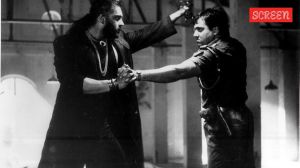The bandit as subaltern hero
It is not just that one man has mocked the might of two state governments for nearly two decades. Or that he has been aided and abetted in...

It is not just that one man has mocked the might of two state governments for nearly two decades. Or that he has been aided and abetted in this by local leaders, traders, the forest and police bureaucracy and pockets of popular support. What is most remarkable about the still unfolding Veerappan drama is that amid the sensation and the hype, amid the celebration of the saga and myth of the invincible Bandit King, the fact that he is said to have killed over 130 people and 2000 elephants, poached ivory worth Rs 12 crore and looted sandalwood worth nearly 100 crore, is relegated to just another biographical nugget.
Ever since he carried away Kannada matinee idol Rajkumar into that impenetrable no-police-land he lives in and rules over, we have been flooded with fact and detail about Sandalwood’ Veerappan. The Bandit King, we are told, had humble beginnings. The man who has carried a reward money of Rs 40 lakh on his head was, once upon a time, born into a poor peasant family of backward caste Vanniyars. The family income from a plot of land was neither sufficient nor stable. The boy had to forego school and take to cattlegrazing. From there it was a short step to hunting.
But, it is said, Veerappan is a Good Samaritan. He shares the proceeds with the community. He looks after the poor and dispossessed. He sponsors and participates in the celebration of their festivals. He is the trusted settler of local disputes. We read about the notorious brigand’s many gestures of humanity and kindness to his captives.
We do not have to make do with only second hand accounts either. In 1996, Veerappan told his own story. He said it to a video camera carried to his jungle hideout by the local correspondent of the Tamil political magazine òf40óNakkeeran. The nine hours of videotapes were aired on the DMK-controlled Sun TV. They have subsequently been published in book form.
The outlaw speaks and we listen — about the corrupt and greedy forest bureaucracy, ever willing to be bribed. About the judges who come to hunt in cars escorted by the forest ranger and the District Forest Officer, with crates of whisky and brandy. The Anthiyur MLA who openly smuggles rosewood. The superintendent of police who is known among the local villagers as òf40óaadu thirudi–the goat lifter.
For the scholarly comment on Veerappan’s life and times, we can turn to the Economic and Political Weekly which carried a review of his autobiographical narrative, Mudhal Vettaiyum Mudhal Kolaiyum (December 25, 1999) in an article entitled The Moral World of Sandalwood Veerappan’. Before one can accuse the title of irony, the reviewer hastens to dispel the impression. Veerappan’s story, he says earnestly, is "suffused with moral anger against the state and its minions, an acute sense of commitment to the local community, and an urgency to re-establish an alternative ethico-moral universe of governance". The book, he says, is a "window onto an alternative moral universe that governs subaltern life worlds".
There are questions here. How does Veerappan emerge the hero of our piece? Why is a thief and a murderer given a now awed and then sympathetic hearing? How is it that the tawdriness of his crimes becomes only the footnote to his glossy myth?
We exclaim at the Jungle King. We sympathise with the Backward Caste Underdog. We marvel at the Robin Hood. But what about the Dreaded Criminal? The day after Rajkumar’s abduction, a national daily chronicled him thus on its front page: Age: Fifty seven. Profession: Killing, kidnapping, poaching, smuggling. Hits: 130 murders, slaughter of 2000 elephants…
There is, perhaps, an explanation for this. We share a primordial fascination with the Anti-Hero. The Rebel who refuses to play by the rules and the Underdog who bends the system to his will is an irresistibly romantic image. That the system is itself a deeply corrupt one adds lustre to it.
What lends support to this process is a particular incarnation of an intellectual orientation that gives encouraging space to the discourse of the Other. Whether it is a Phoolan Devi or a Veerappan who confronts us, we are told we must never judge. Listen to them, says the intellectual of this variety, they have a story to tell.
Admittedly, it is necessary to understand why for every hero, the system also spawns an anti-hero. It is important to know what the bandit can reveal about the mayor, what Phoolan Devi or Veerappan can tell us about ourselves. A condemnation based on repression is a weak one. But the danger lies in not knowing when we are crossing the line, when the zeal to understand snowballs into an admiration for genius. And that the genius is a criminal one becomes the qualification in brackets.
For Veerappan today, battle fatigue has set in. After years on the run, it is time to slow down. To write a memoir or two. Or to make a film on his life. Time to rake in the megabucks without running the risk of ivory poaching or sandalwood smuggling. Time, perhaps, to take a leaf out of Phoolan Devi’s book.
It was February 19, 1993. Eleven years after her surrender, Phoolan Devi was freed on parole. As she was released, the daily newspaper told us "onlookers began jostling and shoving each other to get a glimpse of the legend". She was mobbed by photographers, lawyers and reporters the moment she got off the police van. Her lawyer revealed that all political parties had begun wooing her and were "already pulling Phoolan in different directions". Phoolan Devi hails from the backward classes, the Mallahs, and therein, concluded another daily, "lies the attraction many political parties have for her". "Some of the dacoits who were with me in jail have now become politicians" said Phoolan. At the time of her release, several cases of murder, extortion and dacoity were pending against her.
Phoolan Devi was fielded by the Samajwadi Party for the Lok Sabha elections in 1996. She was elected as member of Parliament from Mirzapur. It was a short road from prison to the legislature for the Bandit Queen and it passed through our midst. As Veerappan presents his charter of political demands for Rajkumar’s release, one cannot help but feel a nagging, disquieting sense of deja vu.




- 01
- 02
- 03
- 04
- 05



























